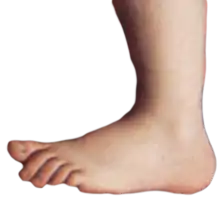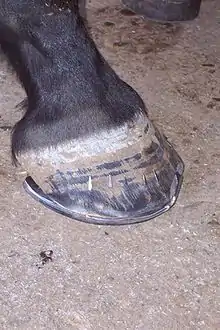pes
English
Pronunciation
- IPA(key): /peɪ̯s/
- Rhymes: -eɪs
- Homophone: pace
Noun
pes (plural pedes)
Synonyms
- (neume): podatus
Catalan
Etymology
From Old Catalan pes, from Latin pensum.
Pronunciation
Derived terms
- contrapès
- fer el pes
- pes gall
- pes lleuger
- pes mosca
- pes pesant
- pes ploma
- pes semipesat
- pes wèlter
- sobrepès
- sobrepesca
Related terms
References
- “pes” in Diccionari de la llengua catalana, segona edició, Institut d’Estudis Catalans.
- “pes” in Diccionari català-valencià-balear, Antoni Maria Alcover and Francesc de Borja Moll, 1962.
Czech
Pronunciation
- IPA(key): [ˈpɛs]
audio (file) - Hyphenation: pes
- Rhymes: -ɛs
Declension
Derived terms
- hlídací pes
- honicí pes
- chování řeznického psa
- mnoho psů, zajícova smrt
- pejsánek
- pejsek
- psí
- psoun
- starého psa novým kouskům nenaučíš
Further reading
Etymology 2
See the etymology of the corresponding lemma form.
Alternative forms
Friulian
Alternative forms
- peš (alternative spelling)
Indonesian
Etymology
From Dutch pest, from Middle French peste (whence French peste), ultimately from Latin pestis.
Pronunciation
- IPA(key): [ˈpɛs]
- Hyphenation: pès
Further reading
- “pes” in Kamus Besar Bahasa Indonesia, Jakarta: Language Development and Fostering Agency — Ministry of Education, Culture, Research, and Technology of the Republic Indonesia, 2016.
Latin


Etymology
From Proto-Italic *pets, from Proto-Indo-European *pṓds (compare Sanskrit पद् (pád), Ancient Greek πούς (poús) and Old English fōt, whence English foot).
Pronunciation
- (Classical) IPA(key): /peːs/, [peːs̠]
- (Ecclesiastical) IPA(key): /pes/, [pɛs]
Audio (Classical) (file)
Noun
pēs m (genitive pedis); third declension
- a foot, in its senses as
- (anatomy) a human foot
- … ne manus, nec pedes, nec alia membra …
- … not the hands, not the feet, and not the other limbs …
- 8 CE, Ovid, Fasti 6.395-397:
- Forte revertēbar fēstīs Vestālibus illa [...].
hūc pede mātrōnam vīdī dēscendere nūdō.- It so happened that I was returning from the festival of Vesta [...]. Here I saw a matron coming down barefoot.
(Literally, in the ablative singular: “pede nūdō” or “with bare foot.” Roman matrons walked barefoot to honor Vesta (mythology) during the Vestalia.)
- It so happened that I was returning from the festival of Vesta [...]. Here I saw a matron coming down barefoot.
- Forte revertēbar fēstīs Vestālibus illa [...].
- (zoology) any equivalent body part of an animal, including hooves, paws, etc.
- (units of measure) any of various units of length notionally based on the adult human foot, especially (historical) the Roman foot.
- (poetry) a metrical foot: the basic unit of metered poetry
- 8 CE – 12 CE, Ovid, Tristia 1.15-16:
- vāde, liber, verbīsque meīs loca grāta salūtā:
contingam certē quō licet illā pede!- Go, [my] book, and greet with my words [those] beloved places: at least I shall reach [them] with the ‘foot’ that is allowed!
(The exiled poet puns that the metrical “feet” of his poem shall go where his own “feet” cannot.)
- Go, [my] book, and greet with my words [those] beloved places: at least I shall reach [them] with the ‘foot’ that is allowed!
- vāde, liber, verbīsque meīs loca grāta salūtā:
- (anatomy) a human foot
- (figuratively) a place to tread one's foot: territory, ground, soil
- (nautical) a rope attached to a sail in order to set
- (music) tempo, pace, time
- (botany) the pedicel or stalk of a fruit
Declension
Third-declension noun.
| Case | Singular | Plural |
|---|---|---|
| Nominative | pēs | pedēs |
| Genitive | pedis | pedum |
| Dative | pedī | pedibus |
| Accusative | pedem | pedēs |
| Ablative | pede | pedibus |
| Vocative | pēs | pedēs |
Hyponyms
- (metrical foot): trochaeus; pes dissyllbus or disyllbus, pes bibrevis, choreus, jambus, spondeus, spondius, spondeos (2-syllable feet); pes trisyllabus, amphibrachus, amphibrachys, amphimacrus, dactylus, extensipes, molossus, pes anapaestus, pes antanapaestus, pes antibacchius, pes bacchius, pes creticus, pes hippius (3-syllable feet); pes tetrasyllbus, antispastus, chorjambus, dichoreus, dijambus, dispondeus, epitritus, paeon, proceleumaticus, proceleusmaticus (4-syllable feet); pes pentasyllbus, dochmius, mesobrachys, mesomacros, pariambodes, probrachys, pes amoebaeus, pes antamoebaeus, pes orthius (5-syllable feet)
Meronyms
- (unit of length): decempeda (10 pedes)
Derived terms
- adversipedes
- aenipes
- aeripes
- agipes
- alipes
- anguipes
- antepes
- avipes
- bipeda
- bipēs
- capripes
- celeripēs
- centipeda
- centipes
- citipes
- compes
- cornipes
- decempeda
- decempeda
- fissipes
- flammipes
- flexipes
- gracilipes
- hircipes
- ignipes
- lanipes
- latipes
- lentipes
- levipes
- longipes
- loripes
- milepeda
- mollipēs
- multipeda
- octipes
- palmipes
- peda
- pedālis
- pedāneus
- pedārius
- pedātim
- pedātūra
- pedātus
- pedeplana
- pedepressim
- pedēs
- pedetemptim
- pedica
- pedicinus
- pediculus
- pedisequus
- pedō
- pedocucullus
- pedūlis
- pedum
- planipes
- plumipes
- properipes
- quadrupēs
- remipes
- segnipes
- semipes
- septipes
- serpentipes
- sesquipes
- solidipes
- sonipes
- stapēs
- suppes
- tardipes
- tremipes
- tripudium
- uncipes
- unipes
- volucripes
Descendants
- Balkan Romance:
- Dalmatian:
- Italo-Romance
- Padanian:
- Northern Gallo-Romance:
- Southern Gallo-Romance:
- Ibero-Romance:
- Sardinian:
- Derived forms:
- ⇒ Vulgar Latin: *pedicāre
- Catalan: petjar
- ⇒ Vulgar Latin: *pedicāre
- Borrowings:
See also
- pede tellūrem pulsō
- pedem effero
- pedem fero
- pedem refero
- pedes navales
- si in fundo pedem posuisses
- a pedibus usque ad caput
- alterno pede terram quatere
References
- “pes”, in Charlton T. Lewis and Charles Short (1879) A Latin Dictionary, Oxford: Clarendon Press
- “pes”, in Charlton T. Lewis (1891) An Elementary Latin Dictionary, New York: Harper & Brothers
- pes in Charles du Fresne du Cange’s Glossarium Mediæ et Infimæ Latinitatis (augmented edition with additions by D. P. Carpenterius, Adelungius and others, edited by Léopold Favre, 1883–1887)
- pes in Gaffiot, Félix (1934) Dictionnaire illustré latin-français, Hachette
- Carl Meißner; Henry William Auden (1894) Latin Phrase-Book, London: Macmillan and Co.
- to begin a journey (on foot, on horseback, by land): iter ingredi (pedibus, equo, terra)
- to go on foot: pedibus ire
- to trample under foot: pedibus obterere, conculcare
- to have the gout: ex pedibus laborare, pedibus aegrum esse
- to vote for some one's motion: discedere (pedibus), ire in alicuius sententiam (Liv. 23. 10)
- to serve in the cavalry, infantry: equo, pedibus merere (Liv. 27. 11)
- (ambiguous) a hand-to-hand engagement ensued: tum pes cum pede collatus est (Liv. 28. 2)
- (ambiguous) to fall at some one's feet: ad pedes alicuius accidere
- (ambiguous) to throw oneself at some one's feet: ad pedes alicuius se proicere, se abicere, procumbere, se prosternere
- (ambiguous) to prostrate oneself before a person: ad pedes alicuius iacēre, stratum esse (stratum iacēre)
- (ambiguous) to fail to see what lies before one: quod ante pedes est or positum est, non videre
- (ambiguous) to never set foot out of doors: domo pedem non efferre
- (ambiguous) to cross the threshold: pedem limine efferre
- (ambiguous) a hand-to-hand engagement ensued: tum pes cum pede collatus est (Liv. 28. 2)
- (ambiguous) hand to hand: collato pede (Liv. 6. 12)
- (ambiguous) to retire (without turning one's back on the enemy): pedem referre
- to begin a journey (on foot, on horseback, by land): iter ingredi (pedibus, equo, terra)
- “pes”, in Harry Thurston Peck, editor (1898) Harper's Dictionary of Classical Antiquities, New York: Harper & Brothers
- “pes”, in William Smith et al., editor (1890) A Dictionary of Greek and Roman Antiquities, London: William Wayte. G. E. Marindin
Middle English
Old Czech
Etymology
From Proto-Slavic *pьsъ.
Declension
| singular | dual | plural | |
|---|---|---|---|
| nominative | pes | psy, psa | psi, psové (psoví), psie (psí), psy |
| genitive | psa, psu | psú (psou) | psóv (psuov, psů), pes |
| dative | psu, psovi | psoma, psama | psóm (psuom, psům) |
| accusative | pes, psa | psy, psa | psi, psové (psoví), psie (psí), psy |
| vocative | pse | psy, psa | psi, psové (psoví), psie (psí), psy |
| locative | psě (pse), psu, psovi | psú (psou) | psích, psiech, psech, psách |
| instrumental | psem | psoma, psama | psy, psmi, psami |
Descendants
- Czech: pes
Further reading
- “pes”, in Vokabulář webový: webové hnízdo pramenů k poznání historické češtiny [online], Praha: Ústav pro jazyk český AV ČR, 2006–2023
Old French
Noun
pes f (oblique plural pes, nominative singular pes, nominative plural pes)
- Alternative form of pais (“peace”)
- circa 1250, Marie de France, Guigemar
- Va t'en de ci ! Lai me aveir pes.
- Go, leave me! Let me have peace.
- Va t'en de ci ! Lai me aveir pes.
- circa 1250, Marie de France, Guigemar
Romani
Alternative forms
Etymology
Inherited from Sauraseni Prakrit [script needed] (appa),[1] [script needed] (atta),[1] from Sanskrit आत्मन् (ātman).[1]
Descendants
- Kalo Finnish Romani: pes
See also
| Number | Person | Gender | Nominative | Accusative | Dative | Locative | Ablative | Instrumental | Possessive |
|---|---|---|---|---|---|---|---|---|---|
| Singular | First | — | me | man | manqe | manθe | manθar | mança | miro, -i, -e |
| Second | — | tu | tut | tuqe | tuθe | tuθar | tuça | tiro, -i, -e | |
| Reflexive third | — | — | pes | pesqe | pesθe | pesθar | peça | pesqero, -i, -e | |
| Third | Masculine | ov | les | lesqe | lesθe | lesθar | leça | lesqero, -i, -e | |
| Feminine | oj | la | laqe | laθe | laθar | laça | laqero, -i, -e | ||
| Plural | First | — | amen | amenqe | amenθe | amenθar | amença | amaro, -i, -e | |
| Second | — | tumen | tumenqe | tumenθe | tumenθar | tumença | tumaro, -i, -e | ||
| Reflexive third | — | — | pen | penqe | penθe | penθar | pença | penqero, -i, -e | |
| Third | — | on | len | lenqe | lenθe | lenθar | lença | lenqero, -i, -e | |
| Number | Person | Gender | Nominative | Accusative (long and short forms) | Dative | Locative | Ablative | Instrumental | Possessive |
|---|---|---|---|---|---|---|---|---|---|
| Singular | First | — | me | man, ma | mánge | mánde | mándar | mánsa | múrro m, múrri f, múrre pl |
| Second | — | tu | tut, tu | túke | túte | tútar | túsa | tíro m, tíri f, tíre pl | |
| Reflexive third | — | — | pês, pe | pêske | pêste | pêstar | pêsa | pêsko m, pêski f, pêske pl | |
| Third | Masculine | wo | lês, le | lêske | lêste | lêstar | lêsa | lêsko m, lêski f, lêske pl | |
| Feminine | woi | la, la | láke | láte | látar | lása | láko m, láki f, láke pl | ||
| Plural | First | — | ame | amên, ame | amênge | amênde | amêndar | amênsa | amáro m, amári f, amáre pl |
| Second | — | tume | tumên, tume | tumênge | tumênde | tumêndar | tumênsa | tumáro m, tumári f, tumáre pl | |
| Reflexive third | — | — | pên, pe | pênge | pênde | pêndar | pênsa | pêngo m, pêngi f, pênge pl | |
| Third | — | won | lên, le | lênge | lênde | lêndar | lênsa | lêngo m, lêngi f, lênge pl |
References
- Boretzky, Norbert; Igla, Birgit (1994), “pe(s)”, in Wörterbuch Romani-Deutsch-Englisch für den südosteuropäischen Raum : mit einer Grammatik der Dialektvarianten [Romani-German-English dictionary for the Southern European region] (in German), Wiesbaden: Harrassowitz Verlag, →ISBN, page 215a
Slovak
Etymology
Inherited from Proto-Slavic *pьsъ.
Pronunciation
- IPA(key): /ˈpɛs/
Declension
Further reading
- pes in Slovak dictionaries at slovnik.juls.savba.sk
Slovene

Etymology
From Proto-Slavic *pьsъ.
Pronunciation
- IPA(key): /pə́s/
Noun
pə̏s m anim (female equivalent psíca)
Inflection
| Masculine anim., hard o-stem | |||
|---|---|---|---|
| nom. sing. | pes | ||
| gen. sing. | psa | ||
| singular | dual | plural | |
| nominative (imenovȃlnik) |
pes | psa | psi |
| genitive (rodȋlnik) |
psa | psov | psov |
| dative (dajȃlnik) |
psu | psoma | psom |
| accusative (tožȋlnik) |
psa | psa | pse |
| locative (mẹ̑stnik) |
psu | psih | psih |
| instrumental (orọ̑dnik) |
psom | psoma | psi |
Further reading
- “pes”, in Slovarji Inštituta za slovenski jezik Frana Ramovša ZRC SAZU, portal Fran
Spanish
Pronunciation
- IPA(key): /ˈpes/ [ˈpes]
- Rhymes: -es
- Syllabification: pes
- Homophone: (Latin America) pez
Tok Pisin
Noun
Lua error: not enough memory. See Wiktionary:Lua memory errors for more information.
Torres Strait Creole
Etymology 1
From English face.
Noun
Lua error: not enough memory. See Wiktionary:Lua memory errors for more information.
Turkish
Pronunciation
- Lua error: not enough memory. See Wiktionary:Lua memory errors for more information.
- Lua error: not enough memory. See Wiktionary:Lua memory errors for more information.
Etymology 1
Lua error: not enough memory. See Wiktionary:Lua memory errors for more information. from Lua error: not enough memory. See Wiktionary:Lua memory errors for more information.,[1][2] from Lua error: not enough memory. See Wiktionary:Lua memory errors for more information..
Interjection
Lua error: not enough memory. See Wiktionary:Lua memory errors for more information.
- Lua error: not enough memory. See Wiktionary:Lua memory errors for more information. "I yield!" or "Uncle!"
- Lua error: not enough memory. See Wiktionary:Lua memory errors for more information. "I don't even know what to say!", "This is too much!" or "This takes the cake!"
- Lua error: not enough memory. See Wiktionary:Lua memory errors for more information.
Derived terms
Lua error: not enough memory. See Wiktionary:Lua memory errors for more information.
Etymology 2
Lua error: not enough memory. See Wiktionary:Lua memory errors for more information. from Lua error: not enough memory. See Wiktionary:Lua memory errors for more information.,[3][4] from Lua error: not enough memory. See Wiktionary:Lua memory errors for more information..[5]
Adjective
Lua error: not enough memory. See Wiktionary:Lua memory errors for more information.
Derived terms
Lua error: not enough memory. See Wiktionary:Lua memory errors for more information.
Alternative forms
- Lua error: not enough memory. See Wiktionary:Lua memory errors for more information.
Etymology 3
Lua error: not enough memory. See Wiktionary:Lua memory errors for more information. from Lua error: not enough memory. See Wiktionary:Lua memory errors for more information., from Lua error: not enough memory. See Wiktionary:Lua memory errors for more information..
Noun
Lua error: not enough memory. See Wiktionary:Lua memory errors for more information.
Adverb
Lua error: not enough memory. See Wiktionary:Lua memory errors for more information.
- Lua error: not enough memory. See Wiktionary:Lua memory errors for more information. then, so, in that case
- Lua error: not enough memory. See Wiktionary:Lua memory errors for more information.
- Lua error: not enough memory. See Wiktionary:Lua memory errors for more information. then, after, afterwards
- Lua error: not enough memory. See Wiktionary:Lua memory errors for more information.
- Lua error: not enough memory. See Wiktionary:Lua memory errors for more information. in summary, in short, in conclusion
- Lua error: not enough memory. See Wiktionary:Lua memory errors for more information.
- Lua error: not enough memory. See Wiktionary:Lua memory errors for more information. when, whenever, as soon as
References
- Redhouse, James W. (1890), Lua error: not enough memory. See Wiktionary:Lua memory errors for more information.”, in Lua error: not enough memory. See Wiktionary:Lua memory errors for more information., Constantinople: A. H. Boyajian, Expression error: Unexpected < operator./mode/2up page 363
- Kélékian, Diran (1911), Lua error: not enough memory. See Wiktionary:Lua memory errors for more information.”, in Lua error: not enough memory. See Wiktionary:Lua memory errors for more information., Constantinople: Mihran, Expression error: Unexpected < operator. page 265
- Redhouse, James W. (1890), Lua error: not enough memory. See Wiktionary:Lua memory errors for more information.”, in Lua error: not enough memory. See Wiktionary:Lua memory errors for more information., Constantinople: A. H. Boyajian, Expression error: Unexpected < operator./mode/2up page 447
- Kélékian, Diran (1911), Lua error: not enough memory. See Wiktionary:Lua memory errors for more information.”, in Lua error: not enough memory. See Wiktionary:Lua memory errors for more information., Constantinople: Mihran, Expression error: Unexpected < operator. page 322
- Nişanyan, Sevan (2002–), Lua error: not enough memory. See Wiktionary:Lua memory errors for more information.”, in Lua error: not enough memory. See Wiktionary:Lua memory errors for more information.
Further reading
- pes in Turkish dictionaries at Türk Dil Kurumu
- Çağbayır, Yaşar (2007), Lua error: not enough memory. See Wiktionary:Lua memory errors for more information.”, in Lua error: not enough memory. See Wiktionary:Lua memory errors for more information. (in Lua error: not enough memory. See Wiktionary:Lua memory errors for more information.), Istanbul: Ötüken Neşriyat, Expression error: Unexpected < operator./mode/1up page 3833
